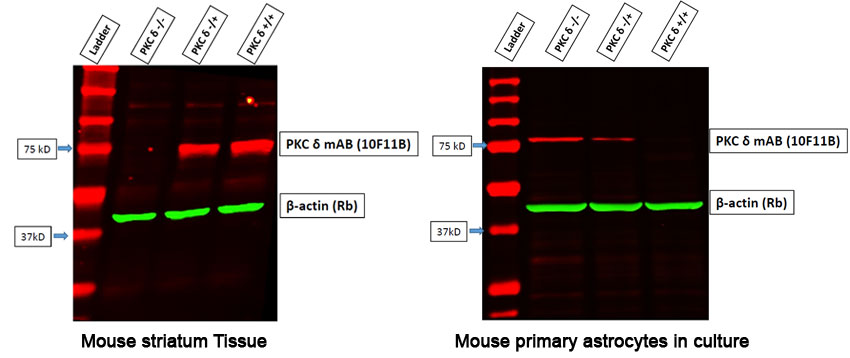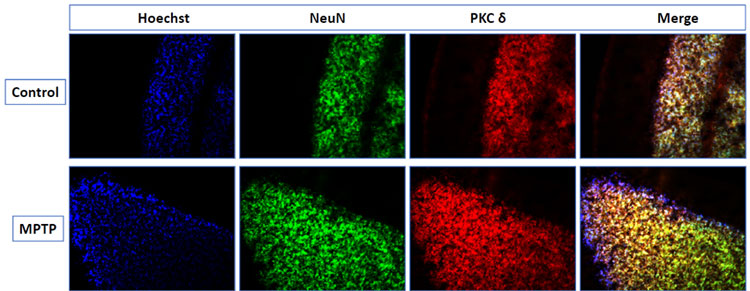Anti-PKC Delta [10F11B] Antibody (supernatant)
This mouse IgGk monoclonal antibody was generated against recombinant protein and recognizes human, mouse and rat protein kinase C delta type (PRKCD, PKC δ).
Highlights:
- Reacts with human, mouse and rat protein kinase C delta type (PRKCD, PKC δ)
- Suitable for Western Blot, ELISA and Immunhistochemistry applications
The PKC family of serine/threonine kinases, including PRKCD (PKC delta), is activated intracellularly by signal transduction pathways. In humans, at least 12 different PKC polypeptides have been identified. These isoforms differ in primary structure, tissue distribution, subcellular localization, mode of action in vitro, response to extracellular signals, and substrate specificity. PKC alpha, beta I, beta II and gamma form the conventional family; their activities are Ca2+- and phospholipid-dependent.
From the laboratory of Anumantha G. Kanthasamy, PhD, Iowa State University.
This mouse IgGk monoclonal antibody was generated against recombinant protein and recognizes human, mouse and rat protein kinase C delta type (PRKCD, PKC δ).
Highlights:
- Reacts with human, mouse and rat protein kinase C delta type (PRKCD, PKC δ)
- Suitable for Western Blot, ELISA and Immunhistochemistry applications
The PKC family of serine/threonine kinases, including PRKCD (PKC delta), is activated intracellularly by signal transduction pathways. In humans, at least 12 different PKC polypeptides have been identified. These isoforms differ in primary structure, tissue distribution, subcellular localization, mode of action in vitro, response to extracellular signals, and substrate specificity. PKC alpha, beta I, beta II and gamma form the conventional family; their activities are Ca2+- and phospholipid-dependent.
From the laboratory of Anumantha G. Kanthasamy, PhD, Iowa State University.
| Product Type: | Antibody |
| Accession ID: | Q05655, NP_006245 |
| Antigen: | Protein kinase C delta type (PRKCD, PKC δ) |
| Molecular Weight: | 77.5 kDa |
| Isotype: | IgGk |
| Clonality: | Monoclonal |
| Clone Name: | 10F11B |
| Immunogen: | Recombinant protein |
| Species Immunized: | Prkcd knock out mice |
| Buffer: | Cell Culture Supernatant |
| Tested Applications: | Western Blot (1: 500), ELISA (1:1000), IHC (1:50) |
| Storage: | -80 |
| Shipped: | Cold Packs |
Western Blot Analysis

Immunohistochemistry Analysis

Data shows PKC delta highly localized in granular cell layer of cerebellum. Experimental Conditions: Antigen retrieval by microwave method. Blocking buffer 3% goat serum 1% triton-X100 in PBS. O/N PRIMARY 1:200 FOR NeuN 1:1000 o/n with secondary. O/N SECONDARY 1:2000
1. Sharma S, Carlson S, Puttachary S, Sarkar S, Showman L, Putra M, Kanthasamy AG, Thippeswamy T. Role of the Fyn-PKCδ signaling in SE-induced neuroinflammation and epileptogenesis in experimental models of temporal lobe epilepsy. Neurobiol Dis. 2018 Feb;110:102-121. View Article
If you publish research with this product, please let us know so we can cite your paper.

![Anti-PKC Delta [10F11B] Antibody (supernatant) Anti-PKC Delta [10F11B] Antibody (supernatant)](https://www.kerafast.com/MediaStorage/Product/Images/Medium/1295_2001202001264212940.jpg)
